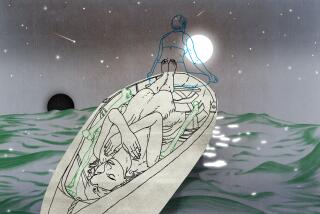Dante’s world
- Share via
BEFORE he went on to become president of Yale and, after that, baseball commissioner, A. Bartlett Giamatti was famous for his dynamic lectures. The talk I heard him deliver when I was an undergraduate posed the question: What, if anything, can you get out of reading “The Divine Comedy” if you don’t share -- or even know very much about -- Dante’s theology? Plenty, was the professor’s answer to his own question. Dante Alighieri (1265-1321) gives us poetry, drama, passion and vision: the portrayal of character and the revelation of personality. Readers ignorant of the poem’s theological background may still find pleasure in the way its stately, intricately wrought form brings to mind a simpler, more orderly cosmos. As the midcentury New Critics always insisted, the poem itself is all you need.
The New Critical emphasis on text rather than context is a good place to start. (One needn’t know the story of Beethoven’s changed opinion of Napoleon to be swept away by the “Eroica.”) Which is not to pretend that nothing can be gained from learning about the background of a work of art. Certainly, there’s no shortage of studies, tomes and monographs being ground out by the mills of academe to edify us.
Manuele Gragnolati’s “Experiencing the Afterlife” (not to be confused with those contemporary accounts of “near-death” adventures found in your local bookstore) is an attempt to understand what people in Dante’s time thought might happen after death but before the promised Resurrection. For modern readers of “The Divine Comedy” fascinated by the “Inferno” but bored as they wend their way through “Purgatorio,” it might indeed help to know more about these concepts.
It’s often been said that Dante “invented” purgatory. More accurately, as Gragnolati, who teaches Italian at Oxford, puts it: “The central section of the ‘Divine Comedy’ ... offers the first thorough and systemic representation of Purgatory” after the Catholic Church defined it in 1274. Gragnolati also argues that in many respects purgatory is not so much a place, like heaven or hell, as a process: a (what else?) purgative process of suffering that, unlike the endless suffering of the damned in hell (who cling to their sins, never learning anything from them), is ultimately fruitful.
Gragnolati’s book draws an elaborate, far-fetched parallel between Dante’s work and that of Bonvesin da la Riva, a popular poet whose visions of the afterlife foreshadowed Dante’s. In the religious thought of Dante’s time, the physical body of the individual played an important role in the afterlife, Gragnolati suggests. At the Last Judgment, the redeemed could look forward to their souls being rejoined to their physical bodies, now rendered free from mortal taint and imperfection.
But this ingenuity still misses what is most astonishing about Dante: the arresting force of his personality. What can one say of the man who put himself at the center of this cosmic journey, peopling the “Inferno” with characters he knew and bestowing on a girl named Beatrice (who meant a lot to him) an amazingly exalted status, poetically eclipsing the saints and the Virgin Mary? In this case, we are not talking about the individuality that Gragnolati discerns in medieval culture, which has to do with every person having a soul and body. We are talking about something utterly unique to one individual: Dante. Call it genius, call it the egotistical sublime, contrast it with the still greater genius of Shakespeare based not on egotism but on self-effacement: It is what makes “The Divine Comedy” like nothing else ever written. *
More to Read
Sign up for our Book Club newsletter
Get the latest news, events and more from the Los Angeles Times Book Club, and help us get L.A. reading and talking.
You may occasionally receive promotional content from the Los Angeles Times.










